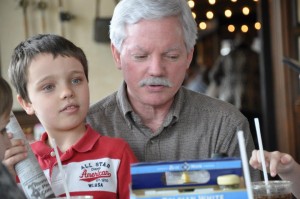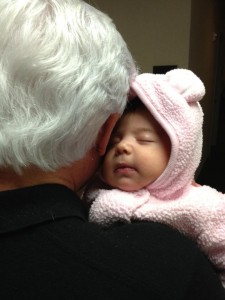by Katherine Norris | May 14, 2020 | Academics, COBA Faculty, Faith Infusion, Outcomes, Poverty and Development, Research, Uncategorized
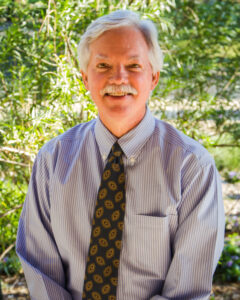 Do you ever wonder what COBA professors do when they aren’t teaching class? You may not know it, but many of our professors commit their time to conducting research of all different types. Dr. Monty Lynn recently co-authored a research article titled, “Better Together: Improving Food Security and Nutrition by Linking Market and Food Systems”. The article is a literature review of market and food systems informing on the latest impacts of COVID-19 towards global food security.
Do you ever wonder what COBA professors do when they aren’t teaching class? You may not know it, but many of our professors commit their time to conducting research of all different types. Dr. Monty Lynn recently co-authored a research article titled, “Better Together: Improving Food Security and Nutrition by Linking Market and Food Systems”. The article is a literature review of market and food systems informing on the latest impacts of COVID-19 towards global food security.
Dr. Lynn says, “The article is the fruit of a collaborative effort with technical advisors at World Vision and CARE, supplemented by faculty members at ACU and the Catholic University of America. To share the findings, the article authors will host a webinar in June to describe our work, mostly with a global CARE and World Vision audience. In the article, we combine two popular approaches in global food security which attempt to strengthen markets and nutrition, and we describe CARE and World Vision food security programming that illustrates the model. In the webinar, we will describe the latest information from CARE and World Vision on how the coronavirus pandemic and COVID-19 are impacting global food security.” Dr. Lynn notes that “It is a welcome and special opportunity to join a research team with two of the largest development organizations in the United States and to collaborate with my colleague, Dan Norell, a Senior Technical Advisor in Economic Development at World Vision in Washington, D.C.”
The article and webinar will explore the following:
- The Inclusive Market and Food Systems Model
- The importance of bringing the market to vulnerable households
- How empowering women multiplies nutritional outcomes
- How access does not necessarily equal consumption
- The impact of COVID-19 on programming and adaptive management for livelihood programs
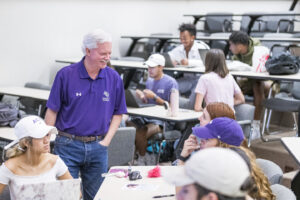
Photo by Jeremy Enlow
International development is a topic that Dr. Lynn stays current with for his research and an International Development class that he occasionally teaches at ACU. His recent research shows that “Major gains have been made in global food security, reducing global hunger. Gains began eroding in 2015, however, and global food insecurity began rising again. Nearly one billion people are food insecure today and 140 million of those became food insecure because of the impact of the coronavirus pandemic and mitigation efforts that have disrupted food production and supply chains.”
This blog post is just a glimpse of the information that is covered in the research article. We encourage you to read the full article HERE and join the webinar on May 19th at 12:30 pm EST, Washington, D.C. time zone HERE.
by Hanna Roberts | Apr 2, 2018 | Academics, Current Students, Faith Infusion, Marketing, Poverty and Development, Student Spotlights, Student Spotlights, Uncategorized
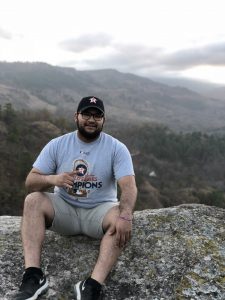
Caleb Casas, junior management and marketing major from Houston, TX.
Over spring break, the Griggs Center and Halbert Institute partnered to send a group of students led by Dodd Roberts with Dr. Sarah Easter to Honduras. The group collaborated with Mission Lazarus to work within the communities on a service trip. Caleb Casas, a junior marketing and management major from Houston, was one of the students who went and served. Part of the trip entailed meeting with small business owners to help them with current endeavors and to develop new business ideas. Led by Dr. Sarah Easter and Erika Teilmann, a junior management major from Houston, the group of students met for several weeks before their departure to learn about the business climate of the communities they would be working amidst in Honduras. They researched the businesses, resource availability, education levels, income levels, and more. The group kept it a priority to remember that they were not the experts and that they need to trust the people that actually live and work with people in those communities, the people that understand the everyday circumstances, to determine the feasibility of an idea. The students were challenged to read Philippians 2:1-8 before going into the communities to prepare a servant heart within themselves and to learn of and how to imitate Christ’s humility.
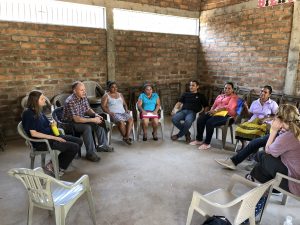 Caleb and the other students met with locals in Namasigue and Cedeño, villages in Honduras, to help build existing businesses and develop new ideas. The people talked about how they would use their businesses to help out the community: to make it possible for everyone to have a little money to buy from one another, to send kids to school, to give to the church, to employ others, and more. In the Namasigue village, all of the businesses are tied together. If only a few people operate a business, then the rest of the village would be unable to purchase from them and would force business owners to sell to ‘coyotes,’ people from bigger cities who come to purchase products in the villages at an extremely low price. It seemed to Caleb that the people had an excellent grasp of how to operate a business in the village but desired feedback on their ideas. They taught the villagers basic accounting so that they could better run their businesses by keeping accurate records, financial statements, and balancing the cost of the business. Both the students and the villagers were able to learn a lot from each other. For example, they met with a woman who planned to sell pigs and wanted to start off with ten. The group encouraged her to start off with three and to buy three pigs every few months so that she had a cycle of product and a steady stream of income instead of trying to sell all of her pigs at the same time. The group suggested that she purchase a male and female to begin breeding so that she wouldn’t have to buy pigs to resell but the women explained that the time and money it takes to breed with the resources available to her was too great for her to ever make a profit.
Caleb and the other students met with locals in Namasigue and Cedeño, villages in Honduras, to help build existing businesses and develop new ideas. The people talked about how they would use their businesses to help out the community: to make it possible for everyone to have a little money to buy from one another, to send kids to school, to give to the church, to employ others, and more. In the Namasigue village, all of the businesses are tied together. If only a few people operate a business, then the rest of the village would be unable to purchase from them and would force business owners to sell to ‘coyotes,’ people from bigger cities who come to purchase products in the villages at an extremely low price. It seemed to Caleb that the people had an excellent grasp of how to operate a business in the village but desired feedback on their ideas. They taught the villagers basic accounting so that they could better run their businesses by keeping accurate records, financial statements, and balancing the cost of the business. Both the students and the villagers were able to learn a lot from each other. For example, they met with a woman who planned to sell pigs and wanted to start off with ten. The group encouraged her to start off with three and to buy three pigs every few months so that she had a cycle of product and a steady stream of income instead of trying to sell all of her pigs at the same time. The group suggested that she purchase a male and female to begin breeding so that she wouldn’t have to buy pigs to resell but the women explained that the time and money it takes to breed with the resources available to her was too great for her to ever make a profit.
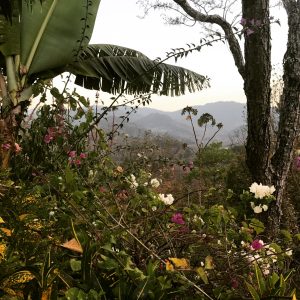 The students also built latrines in the villages as a part of Mission Lazarus’ public health campaigns that aim to engage the community through health promotion and prevention and share essential health teachings with families and communities. The latrines were a tremendous step in both sanitation and privacy for families in the communities. Caleb was struck by how something as small as a latch on a bathroom door gave people basic human dignity. “In America, we don’t have to ever worry about finding a private bathroom to use no matter where we go,” said Caleb. “But the simple act of installing a two-dollar latch allowed these people to go about their business in private and gave them dignity. There was a man who had gone over eighty years without a private bathroom and I was struck by how often I take something like a toilet for granted.” Caleb was also moved by the Hondurans’ gratitude and willingness to work. “They didn’t want us to do the work for them but wanted to work alongside us,” he noted. For the families to even receive a latrine, they had to dig the hole themselves before people would come install the physical latrine. For some people, this meant digging a twelve-foot hole with nothing but a shovel and a chisel. One man chiseled through two feet of solid rock alone. Even though they had done all of this back-breaking work to lay the foundation for the latrines, when the students came to install them, the villagers worked alongside them, helping mix and lay concrete, drilling, and installing the roof. After they had finished installing one of the latrines, a man came and gave them mangoes, which was all he had to give. Caleb was amazed that the people were so grateful that they were willing to give up all that they had to say thank you to the students.
The students also built latrines in the villages as a part of Mission Lazarus’ public health campaigns that aim to engage the community through health promotion and prevention and share essential health teachings with families and communities. The latrines were a tremendous step in both sanitation and privacy for families in the communities. Caleb was struck by how something as small as a latch on a bathroom door gave people basic human dignity. “In America, we don’t have to ever worry about finding a private bathroom to use no matter where we go,” said Caleb. “But the simple act of installing a two-dollar latch allowed these people to go about their business in private and gave them dignity. There was a man who had gone over eighty years without a private bathroom and I was struck by how often I take something like a toilet for granted.” Caleb was also moved by the Hondurans’ gratitude and willingness to work. “They didn’t want us to do the work for them but wanted to work alongside us,” he noted. For the families to even receive a latrine, they had to dig the hole themselves before people would come install the physical latrine. For some people, this meant digging a twelve-foot hole with nothing but a shovel and a chisel. One man chiseled through two feet of solid rock alone. Even though they had done all of this back-breaking work to lay the foundation for the latrines, when the students came to install them, the villagers worked alongside them, helping mix and lay concrete, drilling, and installing the roof. After they had finished installing one of the latrines, a man came and gave them mangoes, which was all he had to give. Caleb was amazed that the people were so grateful that they were willing to give up all that they had to say thank you to the students.
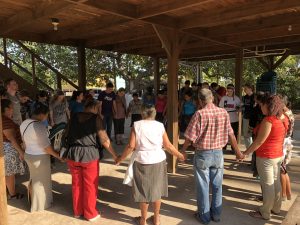 In Honduras, Caleb experienced and was impacted by was God’s purpose and design in bringing us to a specific time and place. Caleb’s grandfather was a pastor in Mexico but came to the US to start a Spanish-speaking congregation within Bammel Church in Houston. Caleb remembered hearing stories about his grandma growing up in Saltillo – no running water, an outhouse that was a mile away, playing soccer with rocks – and realized that, if it had not been for his grandfather saying “yes” to the Lord and leaving his work in Mexico, Caleb could have been in a similar situation to the people he was serving in Honduras. “I was serving what could have been my grandpa,” Caleb realized. “Maybe in three generations, like my family, those people could be in America or helping grow Honduras. You never know what impact you or God will have on people and their life trajectory.”
In Honduras, Caleb experienced and was impacted by was God’s purpose and design in bringing us to a specific time and place. Caleb’s grandfather was a pastor in Mexico but came to the US to start a Spanish-speaking congregation within Bammel Church in Houston. Caleb remembered hearing stories about his grandma growing up in Saltillo – no running water, an outhouse that was a mile away, playing soccer with rocks – and realized that, if it had not been for his grandfather saying “yes” to the Lord and leaving his work in Mexico, Caleb could have been in a similar situation to the people he was serving in Honduras. “I was serving what could have been my grandpa,” Caleb realized. “Maybe in three generations, like my family, those people could be in America or helping grow Honduras. You never know what impact you or God will have on people and their life trajectory.”
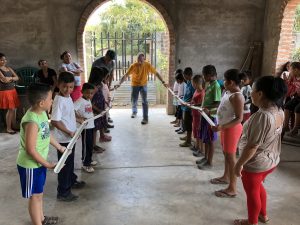 Another surreal moment that Caleb experienced in Honduras was meeting Luis, the preacher of the Honduran church the group was working with. Luis was born in Honduras but moved to the US and actually attended Caleb’s Bammel. Bammel Church sponsored Luis to attend the Baxter Institute, a seminary school in Guatemala. Caleb’s grandfather also taught classes at Baxter during Luis’ time there. Once Luis graduated, he had twenty-three churches where he could have served but felt a calling to go to Namasigue. Caleb was amazed at how God brought them together and connected them at this specific time and place where they were both serving together. “There were so many points in our lives where things could have happened differently,” Caleb said. “Nonetheless, God intersected our lives and that made an impact on me.”
Another surreal moment that Caleb experienced in Honduras was meeting Luis, the preacher of the Honduran church the group was working with. Luis was born in Honduras but moved to the US and actually attended Caleb’s Bammel. Bammel Church sponsored Luis to attend the Baxter Institute, a seminary school in Guatemala. Caleb’s grandfather also taught classes at Baxter during Luis’ time there. Once Luis graduated, he had twenty-three churches where he could have served but felt a calling to go to Namasigue. Caleb was amazed at how God brought them together and connected them at this specific time and place where they were both serving together. “There were so many points in our lives where things could have happened differently,” Caleb said. “Nonetheless, God intersected our lives and that made an impact on me.”
Caleb was absolutely impacted during his time in Honduras. The opportunity to serve and work alongside the people in Namasigue and Cedeño showed him how God works in incredible and mind-blowing ways and His plan is always good. Caleb looks forward to the potential to return to Honduras soon and is even talking about going back this summer.
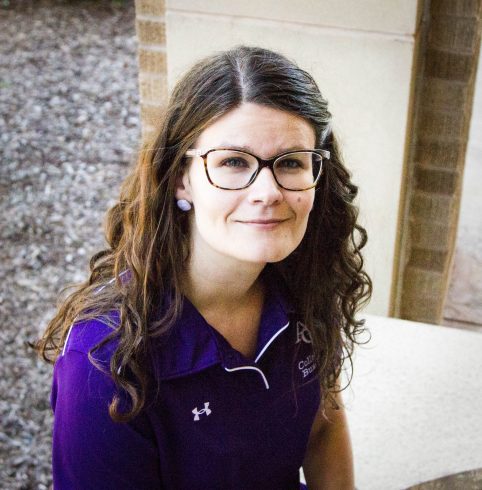
by Hanna Roberts | Feb 23, 2018 | Academics, COBA Faculty, Poverty and Development, Research, Social Entrepreneurship, Uncategorized
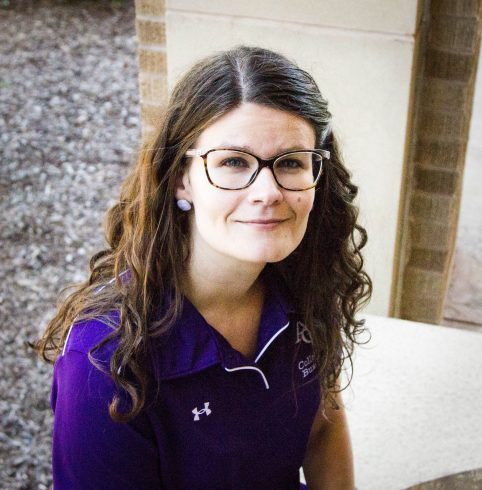
Dr. Sarah Easter is a professor in the College of Business Administration and teaches classes like Strategic Management, Business and Sustainability, and International Business.
Over the summer, Dr. Sarah Easter attended the Academy of Management (AOM) Annual Meeting: a professional association for over 10,000 management and organization scholars whose mission is to build a vibrant and supportive community of scholars by markedly expanding opportunities to connect and explore ideas. The theme of this year’s AOM Annual Meeting was ‘Improving Lives’ and specifically focused on how organizations can contribute to the betterment of society through elevating the health and well-being of those who live in it. In her dissertation research, Dr. Easter conducted a sixteen-month ethnographic study of a coalition to end homelessness in Western Canada. The coalition involved over forty different governmental, business and nonprofit players and she examined how they worked together toward common goals while considering many different perspectives. Dr. Easter presented a paper over one of the key findings of this research and received the Best Paper Award based on a Dissertation from the Managerial and Organizational Cognition Division of the Academy of Management.
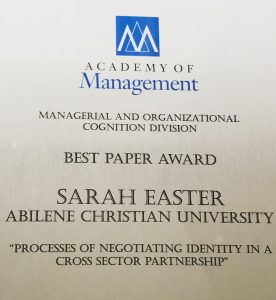
Dr. Sarah Easter was presented with the Best Paper Award for processes of negotiating identity in a cross-sector partnership.
Dr. Easter’s dissertation research centered on the challenge of the coalition: developing a cohesive and unified identity (i.e., its focal purpose and goals) in the face of a variety of different perspectives. Those involved in the coalition had many different viewpoints on what the central issue they were working to address entailed, which was homelessness. Even though all participants talked about the notion that the overall vision to end homelessness was well understood by all involved, the result was that the partnership was often pulled in multiple directions simultaneously. The findings speak to the importance of such collaborative partnerships as being very explicit in terms of the vision they are working to achieve. This involves having ongoing discussions and check-in points to ensure that all players are able to clearly articulate the direction of the partnership, including underlying meanings of terms utilized, particularly as participants are continually cycling in and out. Dr. Easter was fascinated in learning how a diverse body of organizations and individuals from public, private and nonprofit sectors come together to address a significant societal issue over time and was able to develop a deep understanding as to how the coalition evolved over time in the presence of many and very different ways of working.
Dr. Easter took special notice of the pull between both opportunities and challenges that organizations face in carrying out their work while conducting her research. This is something she emphasizes while teaching classes like Strategic Management, Business and Sustainability, and International Business. “I believe strongly that it is important to consider both dimensions in order to develop a more holistic perspective of a given organization’s current situation,” Dr. Easter emphasized. “I bring up this example in my courses: an organization that has incredible potential to make an impact in addressing homelessness in the local region (opportunity). At the same time, though, there are incredible challenges associated with this complex structure.” Dr. Easter continues a passion for studying how people work across cultural and socioeconomic structures especially through addressing major societal challenges and looks for ways to connect with people and organizations as well as share this passion with her students in the classroom.
by Hanna Roberts | Sep 18, 2017 | Academics, COBA Events, Poverty and Development, Social Entrepreneurship, Student Spotlights, Uncategorized
Casey McMullin is a senior financial management major from Colorado Springs, Colorado. This summer, Casey traveled around the world interning and studying abroad. He visited countries in Africa and Asia. Casey returned to Abilene with a changed perspective, new skills, and many stories.
Q: Where did you go and what did you do in Africa?
A: I went to Arusha, Tanzania. It was two hours from Mt. Kilimanjaro, which was amazing to see every morning when we woke up. We were based at Neema Village, where they house 40 babies and at-risk or abandoned children. I helped start a microfinance program so that local mothers can start businesses for additional income.
-

-
Casey with children in Neema Village
-

-
Casey with a child in Tanzania.
Q: Did working with microfinance in Tanzania change your perspective on business?
A: I think that the most challenging part was the difference between Tanzanian and American business and legal environments. When we were building the microfinance program, we had to do everything in accordance with American not-for-profit laws and Tanzanian laws so that they could get loans. A better understanding of business law would have helped.
The nature of business was very different in Tanzania. It was very simple. I had to go back to the foundations and teach the locals so that they could understand what we were doing. At the same time, I had to maintain the financial complexities I had learned so as to ensure that the program would function properly and long past our departure.
Q: What was the most impactful interaction you had with a local?
A: I think that the coolest thing that happened to me happened at the very end of our time in Africa. We only did one test run of a business since it took a long time to set up. We were working with a woman who started a chicken business. We helped her get funding for a bigger coop, food, and medicine for the chickens. On our last day, we were saying goodbye and hugging her. She gave us eggs and then ran to chop down her whole sugar cane. We told her not to, but she cut it down regardless and gave it to us as a thank you.
-

-
Casey and Lexi Koon, junior, with the woman who started a chicken business.
-
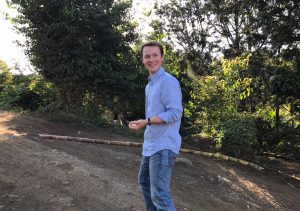
-
Casey with the sugar cane that the woman gave in gratitude.
Q: Where did you go and what did you do in China?
A: We were based in Shanghai and also traveled to Beijing and Hong Kong on the weekends. I took a crash course in basic principles of entrepreneurship and Chinese principles of entrepreneurship. We examined
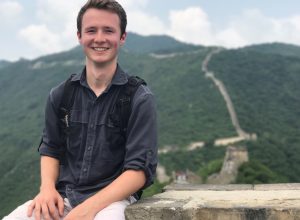
Casey sitting on the Great Wall of China.
the different opportunities to and ways of starting a company in China, visited start-ups, and talked with a number of entrepreneurs, both natives, and expatriates.
Q: What was different about studying business in another country?
A: One thing that struck me was the sheer size of China. The massive populations changed the way they did business in ways I didn’t think about. It was also interesting to see similar priorities between us as well as what each country values more. For example, the Chinese emphasize education starting at a young age and it was interesting to see how that affected business and the way people were.
Q: Did you have a big culture shock moment?
A: Oh yeah. After spending 8 weeks in Africa where there are no Chinese people, we were shocked as soon as we stepped off the plane. There were so many people walking around and they all seemed so busy. There was a class of 30 kids running around and yelling at each other in Chinese and the only thing we could think was “we are in China.”
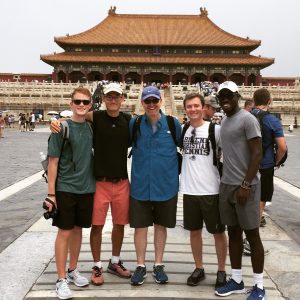
Nicholas Weirzbach, Steven Yang, Dr. Andrew Little, Casey, and Jack Oduro smile in front of the Forbidden City.
Q: Compared to interning, how was study abroad different when it came to cultural immersion?
A: In Africa, I felt like I needed to immerse myself a lot more. I think that this was because I was there to help other people rather than studying for my own benefit. Being there for others drove me to learn the language and immerse myself more since I was not there for myself.
Q: Overall, what was your biggest takeaway from this summer?
A: Take any risk. This summer, I saw just how much people live with nothing. I think that the fear of losing something can hold people back, but that is a mindset that you just can’t live with. You should be doing what you love. Look for an outcome rather than a consequence.
by M. C. Jennings | Aug 24, 2016 | Academics, COBA Faculty, Current Students, Faith Infusion, Poverty and Development, Social Entrepreneurship, Uncategorized
We’re excited to welcome several new professors and staff members to COBA this fall and are continuing our COBA blog spotlight articles to introduce them to you. We’re glad they’re part of our team!

Dr. Sarah Easter
What is your educational background?
PhD in International Management and Organization (University of Victoria, 2016)
MBA, emphasis in International Business and Marketing (Rollins College, 2008)
BBA, Management and Marketing (ACU, 2006)
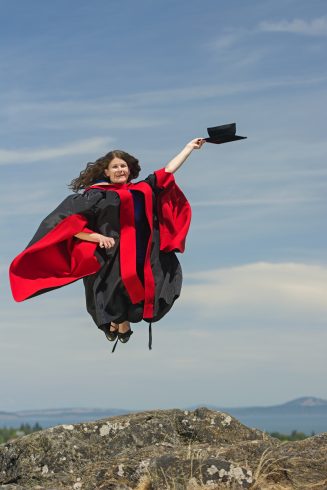
Celebrating her PhD!
What is your work background?
After completing my undergraduate degree at ACU, I went on to complete an MBA designed for students with limited work experiences in Orlando, FL (where I am from) at Rollins. While I was in the program I starting interning at Correct Craft (Anyone into wakeboarding or water skiing? They produce the Nautique brand of boats.) in the marketing department. That internship turned into a full time job upon graduation as a Marketing Specialist, in which case I handled branding and marketing communications for the Nautique brand. After working at Correct Craft for a few years, even though I enjoyed my job, I was itching to move abroad and also to apply my skill sets within a socially focused organization. So, I ended up moving to Vietnam in 2010 through Volunteer Services Overseas to work with a social enterprise as a Business Development and Marketing Advisor for a one-year assignment. While in that position I had the opportunity to teach a business course to the staff (And loved it!) and also started asking a lot of questions about how these types of organizations balance social and financial tensions, etc. Collectively, these experiences in Vietnam led me to consider returning to school to obtain my PhD. When I returned from Vietnam, while I was considering PhD programs, I returned to Correct Craft as a Senior Strategy Analyst working with the senior leadership team and then moved to Canada to pursue my PhD about a year and a half later. I am living proof that God’s plans are far greater than anything we can ask or imagine – I would never have pictured myself coming back to ACU 10 years after I completed my undergraduate to work as a faculty member, but I am so glad that He has led me here!
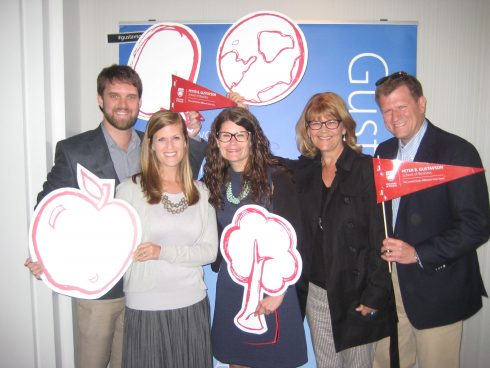
At graduation brunch with my parents, sister and brother-in-law.
What do you teach at ACU?
This semester I am teaching the strategy capstone course. I am excited about the opportunity to work with students as they develop and hone their strategic thinking skills for today’s increasingly complex, ambiguous and dynamic environment – regardless of whether they desire to work in a for-profit, nonprofit or public organization. And, to do so, in a very discussion oriented and applied manner.
What drew you to teaching? Why did you want to work with students?
I have always been a bit of a school nerd and really enjoy and appreciate continuous learning, so the idea of having the opportunity to shape future generations of students and have focused time to continually learn through research and interacting with students is very attractive. However, I never really saw myself in a teaching role. It wasn’t until I lived in Vietnam and had the opportunity to teach a business class to the employees at the social enterprise I worked with that I began to see that as more of a possibility. It was a very challenging experience trying to take business knowledge I had learned in the US environment and contextualize it for Vietnam while also making it relevant and enjoyable for them. Yet, I really enjoyed the experience and it was such a joy getting to see them embrace and understand the material (after a bit of resistance at the beginning).
What’s the best part of working with students?
College is such a formative (and hopefully transformational) experience in a young person’s life not only academically but socially and spiritually as well. It is also such an exciting yet scary time of exploring the large multitude of possibilities as to where God would lead each student both professionally and personally in the future. I love getting to play a small role in students’ development to that end and I am very excited to be at a university that values education as a holistic experience which encompasses academic, social and spiritual components.
Have you ever given up any big opportunities to keep working with students?
When I decided to go back to school to pursue my PhD, I walked away from a lucrative career path. I moved to Western Canada (to a city that is the second most expensive city to live in across Canada) and received a stipend as opposed to the market salary I was used to – which was certainly an adjustment. However, I thoroughly enjoyed the experience, and while it was hard at times, I don’t regret it at all.
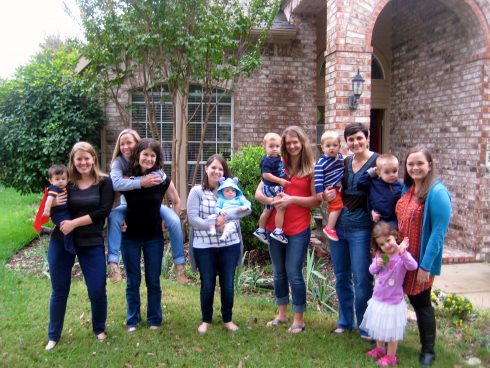
Some of my dearest friends from ACU.
Outside of teaching, what passions and hobbies do you have?
In addition to teaching, I am very passionate about my research that focuses on how people work across cultural differences in support of addressing major societal challenges such as homelessness. Outside of my profession, I enjoy spending time with family and friends – and I am excited to be much closer, geographically speaking, to many of those I hold dear (in comparison to when I was living on an island in Western Canada). I also love to read, try new and different restaurants (I’m a bit of a foodie) and travel (I always have many different places on my list!). As well, I love to go on new ‘mini’ adventures and to try new things – next up on my list is learning to play a musical instrument. I am also contemplating purchasing a motor scooter at some point – I rode one the year I lived in Vietnam and loved it!
What is a good, early story about your teaching?
While I was working on my doctoral degree, I taught a few sections of Leading People and Organizations (also known as Organizational Behavior). Students at this particular institution tended to view this course as a “fluffy” one without a lot of practical value. It was really rewarding for me to see students in that course (even the more reluctant ones) embrace the material, reflect on how the concepts applied to their own situations and to actually have fun in the process of learning.
Tell me about a project or accomplishment that you consider to be the most significant in your career.
Since it is so recent and was such a significant and all-encompassing undertaking, I would have to say my dissertation. I conducted a 16-month ethnographic study of a coalition to end homelessness in Western Canada. I was really interested in how a diverse body of organizations and individuals from public, private and non profit sectors come together to address a significant societal issue over time, in this case homelessness. It was fascinating for me to hear all of the different perspectives and vantage points of the involved organizations and to develop a deep understanding as to how the coalition evolved over time in the presence of many and very different ways of working (e.g., different values, norms, goals). It was also very rewarding to work closely with the coalition and to be able to provide feedback and recommendations to them based on the study. I love conducting research that also has strong practical implications and look forward to developing more similar partnerships in the future as I progress with my research.
Do you do any charity or non-profit work?
While I lived in Canada I was very involved in my church. I taught and mentored middle school girls for a number of years and my life group (also known as small group) volunteered regularly at a youth homeless drop in center. I am looking forward to getting involved in similar types of activities in Abilene as I get settled here.
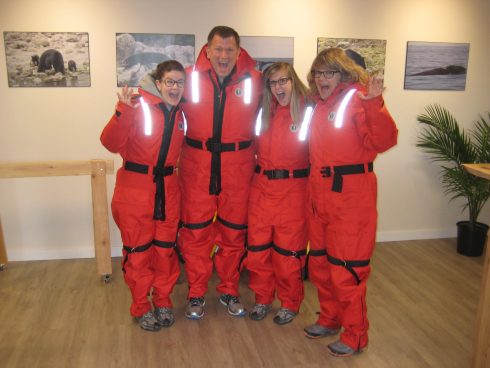
On a bear tour on Vancouver Island with my parents and sister this summer.
Who is your role model, and why?
My parents – they are such amazing examples of living out the Christian faith in their lives. They invest in the people and spaces to which God has called them (which have varied greatly over the years) and truly try to fully grow and develop in each and every season. I have learned so much about hard work and perseverance as well as the importance of laughter and appreciating the journey from watching them over the years.
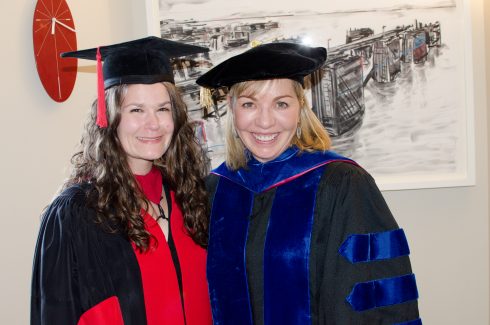
With my dissertation supervisor.
Who was your most inspirational professor and why?
It would be impossible for me to name the many, many individuals who have played an important role in my many, many years of higher education over the years. But, two, in particular, stand out as they both significantly influenced my development as a teacher and scholar:
- My international marketing professor during my MBA program who helped to ignite my passion for using business for social good….which eventually resulted in my working with a social enterprise in Vietnam and then to my pursuing a PhD.
- My dissertation supervisor for her patience and support throughout my PhD journey. She helped me to fully understand and embrace an interdisciplinary approach to capturing today’s complex organizational phenomenal.
If you could have a superpower, what would it be and why?
I think it would be neat to teleport– that would make it much easier for me to travel different places quickly and on the cheap.
What is something that students might be surprised to find out about you?
I used to play lacrosse in high school (although I haven’t played in years). I played defense and was actually pretty aggressive. I was named MVP of defense and played in an all-state game my senior year.
What would you really want students and alums to know about you?
I believe very strongly in the mission and focus of ACU (it was such a formative part of my own development as an undergraduate) and I’m happy to be back as a professor
by M. C. Jennings | Jan 21, 2016 | Academics, COBA Faculty, Current Students, Faith Infusion, Poverty and Development, Research, Uncategorized
What is your educational background?
I studied social work, psychology, business, environmental design, and poverty reduction at Harding, Cornell, Brigham Young, and London.
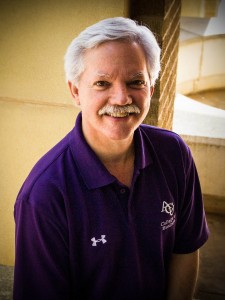
Dr. Monty Lynn
What is your work background?
I’ve enjoyed teaching at ACU for more than three decades! Once in a while, I get the chance to delve into a business environment for a few weeks, most recently last summer with World Vision’s food security team in Washington, DC.
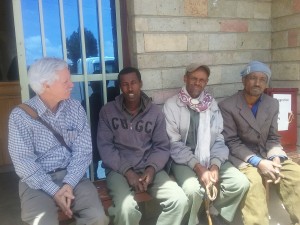
Dr. Lynn on a trip to Ethiopia with VisionFund
What do you teach at ACU?
Management is my primary field. For the past several years I’ve taught the Introduction to Business course and an upper-level course called, “International Poverty and Development.”
What committees/other duties do you have at ACU aside from teaching?
I’ve served in a variety of administrative roles, and loved each one. At present I’m teaching full-time.
What drew you to teaching? Why did you want to work with students?
We have 14 teachers in my family, nine of whom are university professors, so I guess you could say it’s in my blood. When my wife Libby and I first visited ACU, we immediately fell in love with the opportunity to contribute to a Christian business school. It’s been an amazing ride.

Monty and Libby Lynn
What’s the best part of working with students?
Although I enjoy teaching class, it’s the one-to-one encounters with students that create relationships and memories which remain for years.
Have you ever given up any big opportunities to keep working with students?
I can’t imagine not working with students. Working in a university has been a lifelong blessing.

Dr. Lynn working with students on creating lighting for underdeveloped areas
Outside of teaching, what passions and hobbies do you have?
Several years ago I started keeping bees. It’s a modest hobby but it has some interesting bits—a little science, problem solving, the unbelievable wonder of nature, plus, the bees are always trying to kill you. Somehow it’s all quite relaxing.
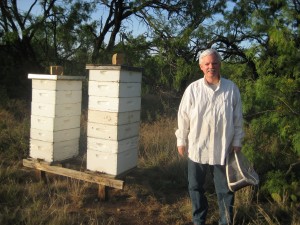
Monty Lynn, aka “Buzzy” the beekeeper
What is a good, early story about your teaching?
I overslept the first final exam I gave at ACU. I arrived ten minutes late with hair dried through the open window of my car as I drove to campus. Somehow the students knew.
Tell me about a project or accomplishment that you consider to be the most significant in your career.
It’s not career, the deep love we feel for our two children, their spouses, and seven grandchildren, and for students we’ve come to know—it’s hard to think of an accomplishment that approaches these in meaningfulness.
Do you do any charity or non-profit work?
Currently, I serve in a local church (Highland) and on a board in Peru—both of which deal with missions and humanitarian development. I enjoy delivering Meals on Wheels on Thursdays too, and often go with students.
Who is your role model, and why?
My parents and in-laws have been exemplars—they’ve lived creative and faithful lives, loving and serving, in pioneering and sacrificial ways. Friends at St. Benedict’s Farm in Waelder, Texas inspire me with their quiet and steady walk with God.
Who was your most inspirational professor and why?
So many professors have shaped me, including professor-colleagues. In terms of inspiration: Keith Warner, a sociologist at BYU, inspired me to think deeply; Warner Woodworth, a BYU business professor, inspired me to act justly; and David Moberg, a research colleague in sociology at Marquette, did both. Duane McCampbell and Dwight Ireland, professors at Harding University, forever changed me with literature and learning.
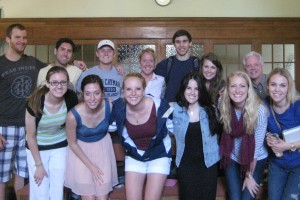
Dr. Lynn with students in Oxford
If you could have a superpower, what would it be and why?
I have enough trouble living with normal powers, but to see one’s desire for God, written on the heart, and to expand human flourishing for all—how wonderful.
What is something that students might be surprised to find out about you?
It’s a real stretch to locate a claim to fame, but my wife’s uncle sang backup for Elvis. Also, I was shot once (everyone survived), was lost in the Canadian Rockies, and I thought very seriously about taking a small airplane for a spin (literally, likely) after finding its key on an airport sidewalk. Oh, and I survived the ACU rodeo (barely) as a member of the COBA faculty steer riding team.
What would you really want students and alums to know about you?
That God’s love, often expressed through others, sustains me; and that he loves us all.
 Do you ever wonder what COBA professors do when they aren’t teaching class? You may not know it, but many of our professors commit their time to conducting research of all different types. Dr. Monty Lynn recently co-authored a research article titled, “Better Together: Improving Food Security and Nutrition by Linking Market and Food Systems”. The article is a literature review of market and food systems informing on the latest impacts of COVID-19 towards global food security.
Do you ever wonder what COBA professors do when they aren’t teaching class? You may not know it, but many of our professors commit their time to conducting research of all different types. Dr. Monty Lynn recently co-authored a research article titled, “Better Together: Improving Food Security and Nutrition by Linking Market and Food Systems”. The article is a literature review of market and food systems informing on the latest impacts of COVID-19 towards global food security.

 Caleb and the other students met with locals in Namasigue and Cedeño, villages in Honduras, to help build existing businesses and develop new ideas. The people talked about how they would use their businesses to help out the community: to make it possible for everyone to have a little money to buy from one another, to send kids to school, to give to the church, to employ others, and more. In the Namasigue village, all of the businesses are tied together. If only a few people operate a business, then the rest of the village would be unable to purchase from them and would force business owners to sell to ‘coyotes,’ people from bigger cities who come to purchase products in the villages at an extremely low price. It seemed to Caleb that the people had an excellent grasp of how to operate a business in the village but desired feedback on their ideas. They taught the villagers basic accounting so that they could better run their businesses by keeping accurate records, financial statements, and balancing the cost of the business. Both the students and the villagers were able to learn a lot from each other. For example, they met with a woman who planned to sell pigs and wanted to start off with ten. The group encouraged her to start off with three and to buy three pigs every few months so that she had a cycle of product and a steady stream of income instead of trying to sell all of her pigs at the same time. The group suggested that she purchase a male and female to begin breeding so that she wouldn’t have to buy pigs to resell but the women explained that the time and money it takes to breed with the resources available to her was too great for her to ever make a profit.
Caleb and the other students met with locals in Namasigue and Cedeño, villages in Honduras, to help build existing businesses and develop new ideas. The people talked about how they would use their businesses to help out the community: to make it possible for everyone to have a little money to buy from one another, to send kids to school, to give to the church, to employ others, and more. In the Namasigue village, all of the businesses are tied together. If only a few people operate a business, then the rest of the village would be unable to purchase from them and would force business owners to sell to ‘coyotes,’ people from bigger cities who come to purchase products in the villages at an extremely low price. It seemed to Caleb that the people had an excellent grasp of how to operate a business in the village but desired feedback on their ideas. They taught the villagers basic accounting so that they could better run their businesses by keeping accurate records, financial statements, and balancing the cost of the business. Both the students and the villagers were able to learn a lot from each other. For example, they met with a woman who planned to sell pigs and wanted to start off with ten. The group encouraged her to start off with three and to buy three pigs every few months so that she had a cycle of product and a steady stream of income instead of trying to sell all of her pigs at the same time. The group suggested that she purchase a male and female to begin breeding so that she wouldn’t have to buy pigs to resell but the women explained that the time and money it takes to breed with the resources available to her was too great for her to ever make a profit. The students also built latrines in the villages as a part of Mission Lazarus’
The students also built latrines in the villages as a part of Mission Lazarus’  In Honduras, Caleb experienced and was impacted by was God’s purpose and design in bringing us to a specific time and place. Caleb’s grandfather was a pastor in Mexico but came to the US to start a Spanish-speaking congregation within
In Honduras, Caleb experienced and was impacted by was God’s purpose and design in bringing us to a specific time and place. Caleb’s grandfather was a pastor in Mexico but came to the US to start a Spanish-speaking congregation within  Another surreal moment that Caleb experienced in Honduras was meeting Luis, the preacher of the Honduran church the group was working with. Luis was born in Honduras but moved to the US and actually attended Caleb’s Bammel. Bammel Church sponsored Luis to attend the Baxter Institute, a seminary school in Guatemala. Caleb’s grandfather also taught classes at Baxter during Luis’ time there. Once Luis graduated, he had twenty-three churches where he could have served but felt a calling to go to Namasigue. Caleb was amazed at how God brought them together and connected them at this specific time and place where they were both serving together. “There were so many points in our lives where things could have happened differently,” Caleb said. “Nonetheless, God intersected our lives and that made an impact on me.”
Another surreal moment that Caleb experienced in Honduras was meeting Luis, the preacher of the Honduran church the group was working with. Luis was born in Honduras but moved to the US and actually attended Caleb’s Bammel. Bammel Church sponsored Luis to attend the Baxter Institute, a seminary school in Guatemala. Caleb’s grandfather also taught classes at Baxter during Luis’ time there. Once Luis graduated, he had twenty-three churches where he could have served but felt a calling to go to Namasigue. Caleb was amazed at how God brought them together and connected them at this specific time and place where they were both serving together. “There were so many points in our lives where things could have happened differently,” Caleb said. “Nonetheless, God intersected our lives and that made an impact on me.”



















